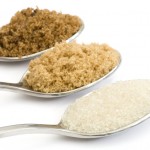 We are born to love sweetness. In nature, almost every plant that tastes sweet is not poisonous, so we are naturally drawn to these foods. Unfortunately, food manufacturers know this and take advantage of it by adding sugar to almost every single product lining grocery store shelves and making super-sweet foods that deaden our taste buds and leave us wanting more. With each new overly sweet food that we consume, whether it is high in calories or not, we dull our palates to other tastes and flavors, especially those of the fruits and vegetables our bodies need.
We are born to love sweetness. In nature, almost every plant that tastes sweet is not poisonous, so we are naturally drawn to these foods. Unfortunately, food manufacturers know this and take advantage of it by adding sugar to almost every single product lining grocery store shelves and making super-sweet foods that deaden our taste buds and leave us wanting more. With each new overly sweet food that we consume, whether it is high in calories or not, we dull our palates to other tastes and flavors, especially those of the fruits and vegetables our bodies need.
We are also altering our brain chemistry by constantly eating more and more sweeter and sweeter foods. Research shows that the excessive consumption of calorically dense foods changes the way that our brain responds to future foods. The effect is akin to a drug addict’s need for more and more heroin to satisfy his craving.
Flexing your (tongue) muscle
Most people don’t realize that your tongue is a muscle, and it has some pretty unique properties. Like any muscle, it needs to be exercised in the proper way. The best way to exercise your tongue, if you want to reign in your quest for sugar (and make the most difference to your waistline), is not to flex or fatigue it, but to stretch it. This means you need to expand the kinds of foods you are eating.
Experts in food neophobia – the fear of new food – have shown that it can take five to ten attempts at trying something new before you reach the point where you don’t reject it outright. That’s a lot of ‘try-it before you buy-it’, but your patience will pay off. Eventually you (or your kids) will reach the point where you kinda, sorta don’t hate broccoli anymore. That is a great day!
Be like Popeye
Just as we are naturally drawn to sweet foods, we are all born with an aversion to bitterness. Who actually remembers liking broccoli, Brussels sprouts, kale orchard the first time you had it? However, the compounds that make foods taste bitter (carotenoids in spinach, flavonoids in cranberries, cocoa and kale, polyphenols in wine) also make them good for us.
As far as you tongue is concerned, sweet and bitter balance one another; that doesn’t mean that we eat them in a balanced manner – most of us certainly do not. It’s been estimated that the average person gets over 33% of their calories from sweets/sugar, but only 5% to 8% from bitter foods. We need to change that balance, but to do so, we need to change our mindset.
Rather than thinking about a food – such as broccoli, cranberries, kale or cocoa – in a negative manner (and let go of those images from childhood), think of the initial shock of that bitter taste as a way to get you more balanced and much healthier. Do you really think Popeye started chugging down cans of spinach from day one? No way! He started the same as you, trying it over and over again because he knew it would help him get stronger and healthier. Next time you’re tempted to turn up your nose at some bitter-full food, think about Popeye and keep this in mind: naturally sweet foods may not be poisonous, manufactured sweet foods certainly are, and bitter foods are the ones that will help you be healthy.
